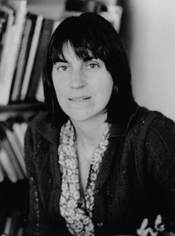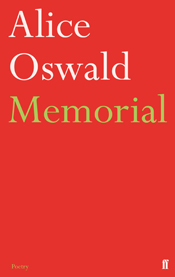Alice Oswald: Winner of the 2013 Warwick Prize for Writing
 British poet Alice Oswald was announced yesterday (Tuesday 24 September 2013) as the winner of the £25,000 Warwick Prize for Writing 2013 for Memorial (Faber and Faber), a glitteringly original poem which is a reworking of Homer's Iliad.
British poet Alice Oswald was announced yesterday (Tuesday 24 September 2013) as the winner of the £25,000 Warwick Prize for Writing 2013 for Memorial (Faber and Faber), a glitteringly original poem which is a reworking of Homer's Iliad.
This unique biennial prize, launched in 2009, is an international cross-disciplinary award open to any genre or form of writing. This is the first time the prize has been won by a poet.
Professor Ian Sansom, Chair of the judges, comments, ‘It was a unanimous decision to award the Warwick Prize for Writing 2013 to Memorial: this is a book that forges its own unique medium of expression. Memorial is a book that looks to the present as well as the past, which combines the personal with the political, and my fellow judges and I were thrilled by its imaginative and intellectual ambition.’
Oswald’s richly imaginative reworking of the Iliad focuses by turns on Homer’s extended similes and on the brief biographies of the minor war-dead, most of whom are little more than names, but each of whom lives and dies unforgettably.

It has been described as ‘remembering on a grand scale. … a concentrated, intense, multi-tasking elegy,’ (Guardian) and ‘magnificently eerie and rich’ (Daily Telegraph).
Alice Oswald won the T.S. Eliot Prize in 2002 for her second collection of poetry, Dart. Her third collection, Woods etc, won the Geoffrey Faber Memorial Prize 2006, and in 2009 she was awarded the Hawthornden Prize for Sleepwalk On The Severn, a poem for several voices set at night on the Severn Estuary.
On winning the prize Alice Oswald said, 'I'm very surprised and grateful, both to the judges and to Homer'.
Memorial was one of six works shortlisted for the prize, the others being fiction and non-fiction titles from British, Iraqi-British, Canadian-British, American-Australian and Israeli authors. A rich and varied list, it saw books from the Chair of Judges for the Man Booker Prize for Fiction 2013, Robert Macfarlane, and theoretical physicist and broadcaster Jim Al-Khalili. It included a polemical look at the science behind sexual difference, a collection of short stories from one of Israel’s greatest writers and a debut novel set in a religious community in rural Wisconsin.
The judges for the Warwick Prize for Writing 2013 were Professor Ian Sansom of the Department of English and Comparative Literary Studies at the University of Warwick (Chair), acclaimed writer Professor Marina Warner CBE and Professor Ed Byrne, Vice-Chancellor and President of Monash University in Melbourne, Australia.
The prize was founded in 2009 and is run by the University of Warwick. However, this year, for the first time, the nominations process was expanded to include Monash University in Melbourne, Australia, following the formation of the Monash-Warwick Alliance. Students and staff at both universities were invited to make nominations from which the judging panel has made their selection.
In addition to the £25,000 monetary prize, Alice Oswald will be awarded the opportunity to take up a short placement at the University of Warwick.
Naomi Klein was the inaugural winner of the prize in 2009, for her book The Shock Doctrine, an exposé of how a privileged few are making millions from worldwide disasters. Peter Forbes won the prize in 2011 for Dazzled and Deceived, a fascinating story of mimicry and camouflage in nature, art and warfare.
Memorial by Alice Oswald
Published by Faber and Faber (2011)
A glitteringly original new poem which is also a version of Homer's Iliad, from prize-winning poet Alice Oswald.
Matthew Arnold praised the Iliad for its 'nobility', as has everyone ever since -- but ancient critics praised it for its enargeia, its 'bright unbearable reality' (the word used when gods come to earth not in disguise but as themselves). To retrieve the poem's energy, Alice Oswald has stripped away its story, and her account focuses by turns on Homer's extended similes and on the brief 'biographies' of the minor war-dead, most of whom are little more than names, but each of whom lives and dies unforgettably - and unforgotten - in the copiousness of Homer's glance.
'The Iliad is an oral poem. This translation presents it as an attempt - in the aftermath of the Trojan War - to remember people's names and lives without the use of writing. I hope it will have its own coherence as a series of memories and similes laid side by side: an antiphonal account of man in his world... compatible with the spirit of oral poetry, which was never stable but always adapting itself to a new audience, as if its language, unlike written language, was still alive and kicking.' - Alice Oswald
Alice Oswald lives in Devon and is married with three children. Dart, her second collection, won the T.S. Eliot Prize in 2002. Her third collection, Woods etc, won the Geoffrey Faber Memorial Prize 2006, and in 2009 she was awarded the Hawthornden Prize for Sleepwalk On The Severn a poem for several voices set at night on the Severn Estuary.
The judging panel
Professor Ian Sansom is a Professor in the Department of English and Comparative Literary Studies at the University of Warwick and teaches on the Warwick Writing Programme. Educated at Oxford and Cambridge, he is former Fellow of Emmanuel College, Cambridge and previously taught at the Seamus Heaney Centre for Poetry at Queen’s University, Belfast. He is the author of nine books, including The Truth About Babies, Ring Road, and the popular Mobile Library series of novels. Ian writes for the Guardian and is a regular broadcaster on BBC Radio 3 and Radio 4.
Marina Warner CBE is a writer of fiction, criticism and history; her works include novels and short stories as well as studies of art, myths, symbols and fairytales. She read French and Italian as an undergraduate at Lady Margaret Hall, Oxford, of which she is now an Honorary Fellow. Since 2004 she has been a professor in the Department of Literature, Film and Theatre Studies at the University of Essex, and holds honorary doctorates from 11 different universities. Her books include Alone of All Her Sex, a study of the cult of the Virgin Mary, Phantasmagoria and the highly acclaimed Stranger Magic: Charmed States and the Arabian Nights, which was published last year. She is currently working on a novel entitled Inventory of a Life Mislaid. Marina was made a CBE for services to literature in 2008.
Professor Ed Byrne became Vice-Chancellor and President of Monash University in Melbourne, Australia, on 6 July 2009. He was a founding director of the Melbourne Neuromuscular Research Unit and the Centre for Neuroscience, and was made Professor of Experimental Neurology at the University of Melbourne in 2001. He first came to Monash University as the Dean of the Faculty of Medicine Nursing and Health Sciences, a role he held from 2003 until 2007. Professor Byrne was then appointed the Vice Provost (Health) at University College London (UCL) and held that position until becoming the eighth Vice-Chancellor at Monash University. The University of Melbourne awarded him a Doctor of Science, and he completed an MBA in 2005.
Notes
· The University of Warwick is one of the UK’s leading research universities. It is consistently ranked in the top 10 of all the University league tables produced by UK national newspapers, and is ranked 7th among the UK's 100 universities for quality of research
· The £25,000 Warwick Prize is entirely self-funded by the University of Warwick. The University is able to make such an investment as it generates the majority of its own income
· The Monash-Warwick Alliance was established in 2011 and offers a new approach to global higher education. It aims to help meet the increasing student, industry and government demand for universities to produce graduates with a global education. To find out more about the alliance visit: http://www2.warwick.ac.uk/about/partnerships/monash
· The Warwick Prize for Writing 2013 shortlist was announced on 30 August. It was:
· Pathfinders: The Golden Age of Arabic Science by Jim Al-Khalili (Penguin) – Non-fiction
· Sufficient Grace by Amy Espeseth (Scribe) – Fiction
· Delusions of Gender by Cordelia Fine (Icon Books) –Non-fiction
· Suddenly, a Knock on the Door by Etgar Keret (Chatto & Windus) – Fiction
· The Old Ways by Robert Macfarlane (Hamish Hamilton) – Non-fiction
· Memorial by Alice Oswald (Faber and Faber) - Poetry
Further information
For further information about The Warwick Prize for Writing, contact Lucy Chavasse or Matt Railton at Four Colman Getty on 020 3697 4254 or 020 3697 4262, lucy.chavasse@fourcolmangetty.co.uk / matt.railton@fourcolmangetty.com
For further information about the University of Warwick, contact Luke Harrison, Press and Communications Manager on 02476 574 255 or 07920 531 221, luke.harrison@warwick.ac.uk

